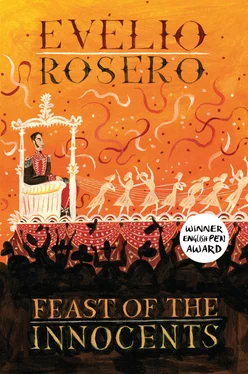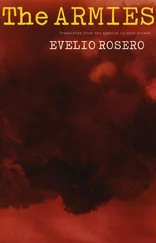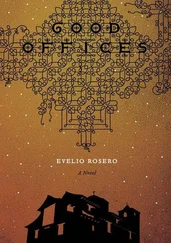Following his words, a silence mightier than a wall rose up in the midst of them all. They could do nothing but raise their glasses — with a stifled reticence.
“I’m listening,” the doctor told his friends. “That’s why I spoke.”
No-one responded.
“Propose the key events, señores , the ones to show on the float.”
The silence continued, but the invitation exerted a powerful influence over the guests: their eyes moved uneasily.
“What do you think?” the doctor coached them, opening his arms.
“More bad business,” Arcaín Chivo said.
The bishop’s meditative voice was heard:
“They’re not going to let you do that to Bolívar, Justo Pastor, in any city in the country, or in any town, or any village.”
“In Pasto they will,” the doctor said.
“Maybe so,” Matías Serrano said. “Maybe in Pasto, if Pastusos remembered. But nobody in Pasto remembers anymore, Justo Pastor. They’ve been efficiently incorporated into the fine history of Colombia, with its whole host of heroes and angels.”
“Don’t you believe it,” the doctor said. And he told them of Zulia Iscuandé and her grandfather’s words: “Bolívar was always a complete son of a bitch.” While repeating the sentence he could do no less than excuse himself in the bishop’s direction, as Arcaín Chivo had done earlier: “Begging the pardon of those present.”
“Do let’s stop asking for the pardon of those present,” the bishop said.
“Yes,” the professor said, “let the people speak how they speak.”
“But how,” the mayor continued, “how will the governor judge the float? What will he decide? He’s a Pasto man, but, like many others, at the front of the queue when it comes to not knowing who Agualongo was, who our hero Agustín Agualongo really was, and he won’t have read Sañudo, and he doesn’t think, he brays; it’s unbelievable the amount of rot a human being can hold inside, not in the gut but in the mind. He’ll confiscate your carriage like he’d confiscate a gun at a party: he’ll return the gun when the party’s over, if he returns it at all, and that’s what he’ll do with your float, he’ll return it after carnival, if he doesn’t destroy it first, along with all the artisans’ good intentions. Don’t make them work in vain, Justo Pastor. Don’t be naive.”
“Naive?” Doctor Proceso asked no-one in particular, his tone pouring scorn on the word, then he got up and walked over to a large piece of pine furniture, to one side of the crackling fire. The watercolour of Primavera Pinzón en plein air presided over the cabinet, and the doctor fretted, bent over the compartments and drawers: he kept part of his research into Simón Bolívar’s life in there. So many years pursuing dates and facts and events, without ever settling down to organize them, he thought, surprised at himself: he felt the presence of the tattered exercise books with their green covers like an accusatory chaos.
He started to look in one of the drawers while he was speaking.
“Years before publishing his Estudios ,” he declared, “Sañudo recognized the need to write about other aspects of Bolívar — not the public ones, but the private. He said the private aspects were a way of getting to know the public, that family life resembles a tracing of public life: the leader is always the same, with the same passions, in the family arena as in that of the state.”
Here Doctor Proceso cleared his throat and cast an uneasy glance around him; Primavera seemed to laugh imperceptibly at his words.
The doctor ignored her.
“Someone wrote that history must treat the great as God treats us all,” he said, “impartially and truthfully; those who want their private life respected must limit themselves to living privately, but those who raise themselves on high are very visible and their vices teach those lower down how to commit them. What did Bolívar teach the whole host of politicians who would succeed him throughout Colombia’s history? Firstly, to think only of themselves: of power. Next, to think only of themselves, of power, and then, power again — and so on and so on to infinity. Never to think of the real needs of the people.”
“How very true,” the mayor said.
Primavera’s fleeting laughter was heard at last. The doctor continued, unaffected:
“If Sañudo covered the political and military sides of the so-called Liberator in his Estudios , he never touched upon other intimate facets, and that was out of pure decorum. Besides, those were not the facets he was interested in. But the polemic his Estudios unleashed in the ‘cultured’ corners of the country tempted him to embark upon Bolívar’s other face, his other dimension, the human one. But, nevertheless, he never did take on the work he talked about.”
“Sañudo didn’t write it,” the professor said, “but he did make ironic comments at times. He alleged that little could be said about Bolívar’s education, because he was packed off to study in Spain when he was seventeen years old and still didn’t even know how to spell; that he was only in school there a year, as he opted to marry his cousin and tour around Europe enjoying himself like the Creole dandy he was.”
The professor laughed at his own wit; no-one joined him.
The mayor chipped in. He picked up with Sañudo again, too:
“Bolívar used to say he benefitted from many teachers — does that prove his learning? When young he had Don Andrés Bello, who had no experience and was not much older than he was himself, and after that Don Simón Rodíguez, a conceited and eccentric fellow, whose real surname was Carreño, which he dropped because of a disagreement with a brother; Rodíguez came from Europe, where he had been immersed in the ideas of the French encyclopédistes , and made a show of his religious indifference to the extreme of giving his children the names of fruits and vegetables.”
“Is that true?” Primavera was constantly being surprised, and let out another yelp of laughter, short, frank, of pure amazement. “I’d like to have known a man like that, father to artichokes and beetroots — what if they’d called me ‘apple?’”
With that hair of yours, golden delicious, thought the professor, going off into a reverie, and he raised his glass and forced the others to do the same.
“To Primavera,” he said, “for her presence, saving grace of the evening.”
Mayor Matías Serrano toasted unenthusiastically, and immediately returned to Sañudo:
“In one of his letters to Bolívar,” he said, “General Sucre told him that Simón Rodíguez (who Bolívar named Director for Public Education) made a lot of silly mistakes and messed up the instruction in schools in Cochabamba, where he’d spent ten or twelve thousand pesos on non-sense in six months. ‘I have asked,’ Sucre wrote to Bolívar, ‘that he bring me in writing the system he wants to adopt, and in eight months he has been unable to present me with it. But in conversation he says one thing one day and the following day another.’”
“He was Bolívar’s tutor,” the doctor said, “Simón Rodíguez, who endeavoured to apply the theories of Rousseau’s Émile to the little Simón, which consisted of not teaching his pupil anything, so that he should remain in a ‘natural’ state and learn what he could on his own account; this meant Bolívar’s early instruction must have been utterly useless.”
The bishop, who had barely spoken, joined in impatiently, as if he wanted to clear the matter up once and for all: “Sañudo pointed out conclusively that Bolívar was made into a myth, such that the common conception of him bears no relation to reality. But so what, Justo Pastor? The people need their hero — what reason is there to topple Bolívar now?”
Читать дальше












